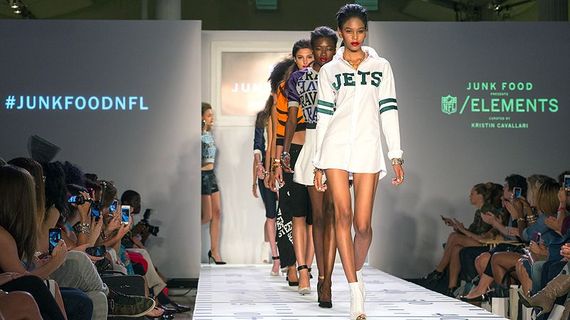The problem of domestic abuse in the offices of 345 Park Avenue in Manhattan -- the NFL's headquarters, is like a lingering BM in a half-bath -- and the stink isn't going away anytime soon, if ever.
The NFL, the game we love, is violent. We know this. It promotes violence. We know this. It rewards players for being violent, we also know this thanks to the uncovering of the New Orleans Saints bounty program (a program not specific to just the Saints). And over the past thirty years, its players have gradually morphed into looking more and more like superheroes rather than football players.
NFL Films, the docudrama in-house production company, was used as a way to help promote the sport and to spread it's growth across the country. It showcased the game's greatest moments, the game's funniest bloopers (insert ascending and descending whistle effect), but more prominently, the game's most violent and brutal hits, celebrating helmets flying off mid-tackle, mouthpieces disintegrating into blades of grass, noses bloodied and crooked, and the iconic two tackles meeting head on at the line of scrimmage like two rams battling atop a mountain, their breathe frosting in the cold weather. Every one of these captured moments beautifully and perfectly synced to symphonies, the moment of impact between two gargantuan men coinciding with the crescendo, the crash of cymbals and the thunder of the timpani, giving the viewer at home a heavy dose of testosterone and the full sense of power and violence.
In the U.S., violence and culture go together like naked selfies and being hacked. Up until a few years ago, ESPN aired segments called "Jacked Up" on their Monday Night Football pre-game show, showcasing the week's biggest and hardest hits by having ex-players turned expert analysts obnoxiously scream "JACKED UP!" at the exact moment a player got hit by a defensive back. After the cumulative effects that these hits had on the brain began making its way into the public conversation, the segment was discontinued as it was seen as promoting violence and not in the best interest.
But promoting violence is what the NFL does. It is, after all, what separated the sport from the other major three in this country, leading to the surge of viewership in the 1990s. It wasn't just a difference in sports viewing, it's the violence itself that Americans love. See the UFC and USA Rugby, for example. Executives have recognized this, and it's why UFC and MMA popularity has surged with the under 35 male demographic. The USA Sevens, the annual rugby tournament which NBC Sports owns the T.V. broadcast rights, is particularly brutal, and went from airing eight hours of live coverage in 2011 to sixteen hours of live coverage just last year. Ratings continue to increase each year and has even beaten out other major sports in major markets around the country.
But the NFL succeeded in its broader goal which was tailoring the sport and its violence to the average male. The average male, who is innately violent by nature. Add your gladiator mentality, steroids, and the idea that weakness somehow makes you less of a man, and it's why violence, whether inflicted by the player on the field, or worse, by the player in the bedroom, will never change. Never.
Richard Wrangham, a Professor of Biological Anthropology at Harvard University, believes violence is innate in all primates, especially in our early hunter/gatherer ancestors, saying, "those (hunter/gatherers) that are in close contact with neighboring hunter/gatherer societies of different languages are always found to be so violent with each other that there were frequent kills of each other... there is a lot of inherent propensity of violence in humans."
As Sports Illustrated points out, from January 1, 2012, to September 11, 2014, "31 NFL players were arrested on charges involving domestic violence, battery, assault and murder." Benjamin Morris over at FiveThirtyEight did a whole breakdown on the comparative statistics on arrests of NFL players to those of the general public, in similar age groups. Though he concluded that violent arrests of NFL players were below the national average (one reason why was that the NFL is a more affluent group, with the poverty rate at or near zero), NFL players had a much higher domestic violence arrest rate relative to the national average of males between the ages of 25-29 -- 55.4 percent to be exact. And that number is more than four times the NFL's number of total arrests (These numbers reflect arrests only and not convictions).
The NFL's history of handling and dealing with domestic violence, and more specifically women, is shameful. It parades its sideline reporters as anything but sideline reporters, essentially forcing them to fit a certain mold that is prized by the superficial guy on the couch with his burger and beer. It doesn't pay its cheerleaders. And it's why we saw Faith Hill and her leather boots singing the lead-in song to the NFL's most popular viewing night -- Sunday Night. Hill was recently replaced by a younger version of Faith Hill called Carrie Underwood (dressed similarly).
Why then was I surprised that the NFL swept the Ray Rice incident under the rug, along with the other 31 arrests for domestic violence?
I wasn't.
Never mind that the sideline reporter is going to be harassed by a section of men that have been drinking since 10 a.m.. Never mind that she'll have unwanted pictures taken of her legs and and other body parts, only to be uploaded and posted to some bro website so that 22-year-old frat boys can anonymously comment and rate her body.
Nevermind all of that. Just buy your pink jersey and pink beer koozie to match, and enjoy the game.
(WOMEN WOMEN WOMEN PINK PINK PINK)
________
[Image Credit: Mike Pont/Getty Images]

